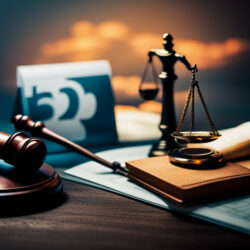Fault in Car Accidents Whose Opinion Matters Most
Establishing culpability in vehicular collisions necessitates meticulous examination of multiple factors and input from various entities.
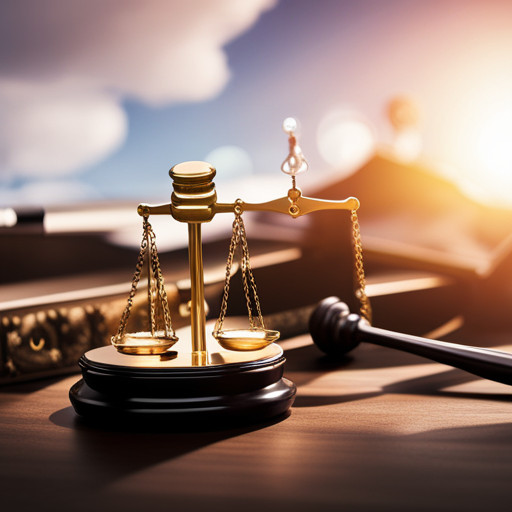
This article delves into the roles of insurance companies, law enforcement, and state-specific laws in fault determination.
It further explores the significance of personal evidence collection and the potential need for legal redress.
Ultimately, it elucidates how fault determination processes can culminate in jury decisions, emphasizing the importance of specialized legal counsel.
Key Takeaways
- Insurance companies determine fault in a car accident by reviewing the police report, witness statements, and available evidence.
- The determination of fault by the insurance adjuster is not the final word, and there are options to ensure a favorable resolution.
- Liability can be established by demonstrating the other driver's violation of traffic laws.
- Law enforcement officers' opinion of fault carries significant weight with insurance companies and juries.
Understanding the Role of Insurance Companies in Determining Fault

In the context of determining fault in car accidents, the role of insurance companies is of paramount importance. These entities investigate the incident through review of police reports, witness statements, and available evidence. They have a particular focus on establishing liability and assessing whether the insured's actions violated any traffic laws.
The role of witnesses is indispensable in this process, as their accounts can provide invaluable insights into the incident. Their testimonies can shed light on what exactly happened and help determine who is at fault.
Simultaneously, the role of insurance adjusters is crucial. They are tasked with impartially assessing the available evidence and determining fault based on their findings. Their investigations often revolve around whether the insured's actions violated traffic laws, and they use this information to establish liability.
This process ultimately determines the burden of financial responsibility following the accident. It is important for insurance companies to accurately determine fault so that the appropriate party is held accountable for the damages and injuries caused.
The Impact of State Laws on Fault Determination
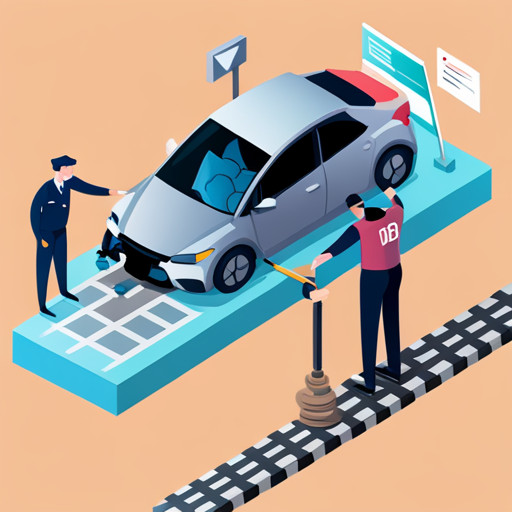
State laws significantly influence the determination of liability in vehicular collisions, with insurance companies relying on these statutes to assess responsibility. These laws help shape the fault determination process, guiding insurance adjusters in their decision-making.
Effect of state laws on fault determination
Certain states follow comparative negligence laws, which apportion fault between parties involved, impacting the claim settlement. In contrast, contributory negligence states completely bar recovery if the claimant is even slightly at fault.
Role of insurance adjusters in determining fault
Adjusters interpret state laws and apply them to the circumstances of the collision. They assess evidence, consider any violation of traffic laws, and determine liability accordingly.
Thus, both state laws and insurance adjusters play pivotal roles in establishing fault in vehicular accidents.
The Significance of Law Enforcement in Car Accident Investigations
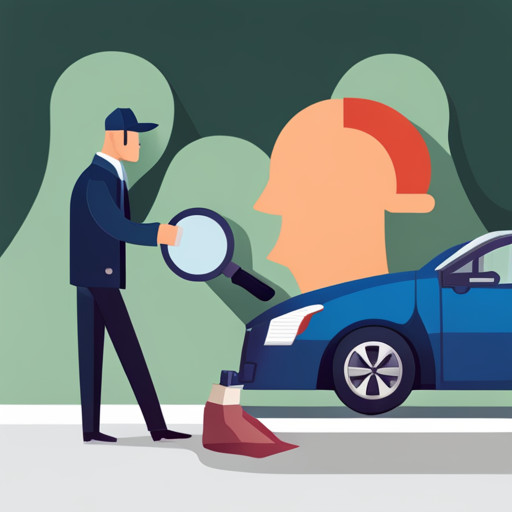
Law enforcement plays a highly significant role in car accident investigations. Their objective findings and reports often carry considerable weight in determining liability. The importance of the police report cannot be overstated as it provides an unbiased account of the incident, which is often essential in insurance claims and court cases.
The police report usually includes observations on the scene, damage to vehicles, indication of law violations, and any citations issued. These details help paint a clear picture of what happened and who may be at fault.
In addition to the police report, the role of witnesses is also instrumental in car accident investigations. Witnesses provide an independent perspective of the event, offering their own accounts of what they saw and heard. These statements, recorded by officers at the scene, can corroborate or dispute the accounts given by the drivers involved.
Consequently, both the police report and witnesses' testimonies are pivotal in establishing fault in car accidents. They provide crucial evidence that helps determine who should be held responsible for the collision.
Importance of Gathering Personal Evidence in Car Accidents

Comprehensive documentation of personal evidence plays a crucial role in substantiating claims following vehicular incidents.
- Gathering Personal Evidence:
- The value of eyewitness testimony:
- Eyewitness accounts can provide an objective perspective on the incident, potentially confirming fault and enhancing the credibility of the claim.
- It is beneficial to collect contact information of eyewitnesses for potential future use in the claim process.
- The role of photographs in proving fault:
- Photographs serve as tangible evidence, documenting the scene of the accident, vehicle damage, and any relevant road conditions or signs.
- Clear and detailed images can significantly contribute to establishing the sequence of events, thereby assisting in determining fault.
Therefore, personal evidence collection, including eyewitness testimonies and photographs, is crucial in the process of fault determination in vehicular incidents.
When to Consider Filing a Lawsuit Over Fault Disagreements

Disputes over liability often necessitate the filing of a lawsuit, particularly when settlement negotiations with insurance adjusters reach an impasse. In situations where the determination of fault in car accidents is contentious, challenging insurance companies requires a strategic approach.
The decision to initiate legal proceedings should not be impulsive but a calculated move after exhausting all other avenues of resolution. A lawsuit, while time-consuming and potentially costly, allows for the presentation of comprehensive evidence before an impartial jury.
Seeking legal advice is paramount before embarking on this course. Legal professionals can provide insights into the likelihood of success based on the specifics of the case, thereby aiding in the decision-making process. In essence, filing a lawsuit over fault disagreements should be a considered action underpinned by competent legal advice.
Role of Juries in Determining Fault in Car Accidents
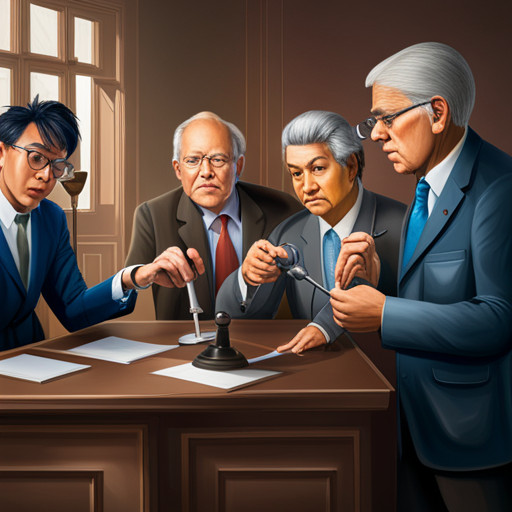
In the adjudication process, juries play a significant role in assessing the evidence and determining liability in motor vehicle collision cases.
The role of evidence in determining fault:
- Juries meticulously analyze all forms of evidence presented, which may include photographs, videos, and witness testimonies.
- The credibility of the evidence and its alignment with the legal definition of negligence is paramount.
Challenges in determining fault in multi-car accidents:
- In scenarios involving multiple vehicles, the task of attributing fault becomes complex.
- Juries must weigh the actions of each driver against the others, considering factors such as violation of traffic laws and reckless driving.
This critical responsibility of juries underscores the importance of comprehensive evidence collection and careful case presentation in court.
Frequently Asked Questions
What Steps Should You Take Immediately Following a Car Accident to Protect Your Interests?
Immediately following a car accident, emergency preparedness and accident documentation are crucial. It is advised to ensure safety of all involved, alert authorities, and seek medical attention.
Documenting the scene through photographs, noting details of the incident, gathering witness information, and retaining a copy of the police report are essential.
Additionally, contacting an insurance provider to report the accident and seeking legal counsel, if necessary, are recommended steps to protect one's interests.
How Can an Attorney Aid in the Process of Determining Fault in a Car Accident?
An attorney can significantly aid in determining fault in car accidents by employing legal defense strategies and leveraging accident reconstruction expertise. They can interpret complex traffic laws, gather and analyze evidence, negotiate with insurance companies, and if necessary, represent the client in court.
Furthermore, they can collaborate with accident reconstruction experts to provide a detailed analysis of the event, thereby strengthening the client's case and increasing the chances of a favorable outcome.
How Does the Insurance Company Calculate the Payout for Damages in a Car Accident?
The payout for damages in a car accident is calculated by insurance companies using damage assessment techniques. These involve evaluating the extent of physical damage to the vehicle, personal injuries sustained, and any other consequential losses.
The payout calculation process also considers the liability percentage of each party involved. Moreover, the insurance adjuster incorporates the cost of repairs, medical expenses, loss of earnings, and often, psychological trauma in determining the final compensation amount.
Can the Decision of the Insurance Company Be Appealed if You Disagree With the Fault Determination?
The appeal process in insurance disputes allows for reconsideration of fault determination. If one is dissatisfied with an insurance company's decision, an appeal can be lodged. This involves submitting relevant documents and evidence to challenge the initial decision.
The insurance company then reviews these materials before making a final determination. In cases where the dispute remains unresolved, legal action may be pursued, potentially leading to a court's involvement in the fault determination.
Are There Any Specific Considerations for Determining Fault in Accidents Involving Commercial Vehicles or Motorcycles?
In determining fault in accidents involving commercial vehicles or motorcycles, specific considerations apply.
Commercial Vehicle Regulations, including logbook adherence, vehicle maintenance, and driver training, are scrutinized.
For motorcycles, adherence to Motorcycle Safety Measures, such as helmet laws and lane-splitting rules, becomes pivotal.
Fault determination also considers the inherent vulnerabilities of motorcycles and the elevated duty of care commercial vehicles typically bear due to their potential for causing substantial harm.

This post has been generated by AI and was not reviewed by editors. This is Not legal advice. Please consult with an attorney.


